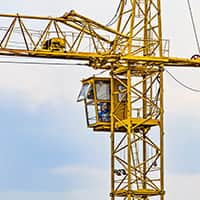How to Get Your Crane Operator Training Online
Written by Michael Purser

Cranes and other lifting machinery are indispensable tools in many industries. Certified crane operators (CCOs) are in high demand at construction sites, ports, warehouses, railway yards, mines and many other jobsites.
This article describes the different types of lifting machines, the certification process, online safety courses and OSHA standards.
NCCCO Certification
OSHA requires workers who use these machines to be certified by a reputable and accredited authority. The National Commission for the Certification of Crane Operators (NCCCO) provides respected credentials for CCOs. The NCCCO is an independent body accredited by the ANSI National Accreditation Board (ANAB), which in turn is an OSHA-approved accreditor of certification programs.
NCCCO provides written and practical exams necessary to become a CCO. To avoid conflicts of interest, it doesn’t provide or endorse any training programs. Instead, it tests and certifies eligible candidates to evaluate their knowledge and skills.
Eligible candidates wanting to become a CCO must:
- Be at least 18 years old
- Pass written core and specialty exams
- Pass practical examinations within a year of passing the written exams
- Comply with the NCCCO Code of Ethics and Substance Abuse Policy
Once a candidate passes the written and practical exams and satisfies all other eligibility requirements, they become certified.
Recertification
Recertification is required once every five years. The recertification test is the same as the initial exam. Any CCO who can demonstrate 1,000 hours of related experience during their initial certification is not required to repeat the practical exam — just the written one.
Operator Safety Training
The path to certification starts with education. Depending on the kind of equipment you want to work with, your curriculum may take a few weeks or longer. You may even benefit from a formal apprenticeship.
Becoming an apprentice allows you to be taught by an experienced professional while earning a paycheck. But applying for a union apprenticeship isn’t the only way to get started.
Safety courses can protect you whether you are an operator or simply work near heavy lifting machinery. Lessons will not only keep you from damaging the machinery and injuring yourself when in the cab. They can also help you avoid common hazards associated with working around powerful equipment.
OSHA Education Center offers three courses that explain OSHA standards and prepare you for your certification test.
Crane Operator Safety Online Course
This program is an overview of fundamentals including common risks, major hazards and safe operating techniques. There is no better place to start your CCO journey than with a strong knowledge of safety essentials.
Cranes, Derricks, Hoists, Elevators and Conveyors Safety Training
You may encounter many kinds of heavy equipment in your workplace. A construction site might contain any number of derricks, hoists, elevators or other machinery.
This one-hour course describes the many lifting devices you might encounter on the job. You will understand the risks, hazards and safe operation procedures for each one.
Types of Lifting Machines
Heavy lifting machines include cranes, derricks and hoists. The exact classification depends on the motion of the load and the construction of the assembly. Cranes move loads vertically and horizontally; hoists only move up and down. Derricks have stationary masts instead of a mobile mast.
Within this broad family, there are many divisions and subdivisions. Instead of overwhelming you with the dozens of specializations you could choose from, here is a broad overview of the types of machines CCOs work with.
Mobile
These machines are usually mounted on a driving chassis. On the smaller side, you might drive a telehandler or telescoping forklift on a construction site. Or you could operate service truck and articulating (knuckle boom) cranes while making deliveries or constructing a house.
You also might need to pilot mobile equipment while building a bridge or working on a freeway overpass.
The courses needed to become certified prepare you to work with a diverse range of haulers across many industries.
Static
This type of lifting device may be permanently fixed in place or broken down, moved and set up in a new location between operations. They don’t alter their fixed position during operation.
This class of lifting machinery is generally used for the heaviest, most demanding tasks. They include gantry lifts used in factories and tower cranes deployed to construct skyscrapers and unload container ships.
Diggers, Pumps and Drills
These use a mast and boom to maneuver specialized equipment rather than lift a payload for transportation. Digger derricks, dedicated pile drivers, driller rigs and concrete pumps help in a variety of excavation and construction scenarios. Everything from utility work to drilling for oil might call for one of these specialized vehicles.
Benefits of Online Courses
Online education is the most convenient way to learn safety basics. You can access OSHA Education Center classes 24/7 from any internet-connected device. Tackle lessons at your own pace and set your own schedule.
You have 180 days from the purchase date to finish your course. At the end of the course, you will receive a certificate of completion to document your accomplishment.
